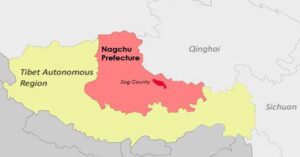 China has jailed 12 villagers in Sog county, Tibet as part of a nationwide anti-crime campaign that some human rights activists say the communist regime is using to target advocates of Tibetan culture and religion.
China has jailed 12 villagers in Sog county, Tibet as part of a nationwide anti-crime campaign that some human rights activists say the communist regime is using to target advocates of Tibetan culture and religion.
The accused were convicted of “running a criminal gang” and sentenced to prison terms ranging from one to almost two years. China Daily reported the defendants had “exploited and harassed villagers, propagated superstitious ideas, and spread the evil of religion”.
Tibet Daily reported the prisoners had been accused of fraud and “using religious influence to interfere with the affairs of local government”.
According to Tibet Daily, all 12 prisoners confessed and will not appeal against their sentences. Authorities have not released the identities of the prisoners except for that of one man identified only by the name of Druk.
Phayul.com reports that the arrests of the 12 prisoners in Sog county are tied to China’s nationwide campaign to “root out dark and evil forces”. The government launched the crackdown in January 2018 and claims a goal of ridding the country of organised crime.
According to The Diplomat, the campaign has mobilised Chinese civil society including the judicial branch, the Ministry of Security, the procuratorates, lawyers, the media and even ordinary citizens in a “People’s War” against crime, a concept created by Mao Zedong during the Cultural Revolution.
According to the Associated Press the campaign has greatly expanded the range of offences for which people can be arrested and jailed to include political and ideological activities the ruling Communist Party considers a threat. Under the campaign, supporting His Holiness the Dali Lama and advocating for the Tibetan language are deemed threats to the social order.
Human Rights Watch has criticised China’s anti-crime campaign stating that it purposely targets political dissidents and those who support His Holiness the Dali Lama, alongside drug dealers and loan sharks.
China has defended its campaign, reporting that it has successfully busted more than 1,200 organised crime gangs and seized more than US$700 million (£540 million) in criminal assets.




 Print
Print Email
Email